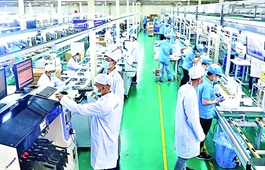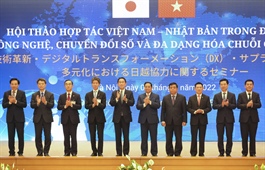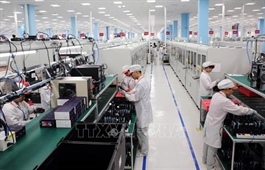Regional focus on supporting Vietnam’s post-Covid recovery: Standard Chartered
Regional focus on supporting Vietnam’s post-Covid recovery: Standard Chartered
Vietnam is a key beneficiary of the Regional Comprehensive Economic Partnership (RCEP).
The RCEP is likely to further boost Vietnam’s exports, support the current account balance, and help attract increased direct investment flows into the country.

Textiles as Vietnam's major export category are expected to benefit from the RCEP. Photo: Nhabe Garment Corp. |
Standard Chartered Bank gave its predictions in the latest Global Research Report titled: “Vietnam - RCEP: Opportunities and challenges”.
Tim Leelahaphan, Economist for Thailand and Vietnam, Standard Chartered said: “The RCEP should boost Vietnam’s exports and improve its access to large consumer markets including China, Japan, South Korea, and Indonesia.”
He underlined that the pact should lower costs for producers in Vietnam and give them access to supply chains that extend across the Asia-Pacific region, most of the input materials for Vietnam’s exports are sourced from RCEP countries.
The Agreement entered into force on January 1 2022 and creates the world’s largest free trade area. The deal is expected to eliminate about 90% of tariffs on trade between the signatories within 20 years.
According to the foreign bank, membership in the pact further strengthens Vietnam’s trade position and should contribute to the post-pandemic recovery this year. The country’s major export categories that are expected to benefit from the RCEP include information technology (IT), textiles, footwear, agriculture, automobile, and telecommunications.
In the long term, the deal could form the basis for a new supply chain in the region, with Vietnam playing a key role. The country targets an average export growth of 6-7% a year from 2021 to 2030.
Leelahaphan added small and medium enterprises (SMEs), which account for 98% of all enterprises in Vietnam and contribute 40% of GDP, are poised to benefit as the pact provides opportunities for them to move up the value chain.
However, Vietnam is also likely to face more competition both in export markets and domestically as a result of the RCEP. For exports, the pact increases competition from other Southeast Asian countries, some of which are strong in similar product categories to Vietnam (such as labor-intensive goods). Over time, this could prompt Vietnam to move into high-tech manufacturing.
The RCEP should facilitate this process, making it easier to source high-quality materials from other member countries and improving market access for higher-value-added goods.
More broadly, the RCEP is likely to accelerate China’s economic integration with the rest of the Asia-Pacific region. Vietnam will continue to benefit from its role as an alternative manufacturing hub as companies adopt a ‘China plus one’ diversification strategy. However, China’s low-cost products will gain better access to Vietnam’s domestic market under the RCEP, posing potential challenges to domestic competitors.
Standard Chartered Bank’s economists expect a strong current account (C/A) surplus and FDI flows to remain the key pillars of support for the Vietnamese dong (VND) over the long run. The RCEP is likely to further boost Vietnam’s exports, support the C/A balance, and help attract increased direct investment flows.
Divya Devesh, Head of ASA FX Research, Standard Chartered Bank, said the sum of Vietnam’s C/A balance and net direct investment has averaged a sizeable US$19 billion annually over the past nine years.
“Given this strong basic balance, we expect the VND to remain on an appreciation path in the coming years. We forecast US-VND at 22,500 by end-2022 and 22,000 by end-2023,” he said.
The trade pact was signed by 10 ASEAN members and five ASEAN partner countries in November 2020 on the sidelines of the 37th ASEAN Summit chaired by Vietnam.
The Agreement will officially come into force 60 days after it is ratified by at least six ASEAN members and three other signatories.
As of November 2, six ASEAN countries, including Vietnam and four other nations including China, Japan, Australia, and New Zealand had submitted documents ratifying the agreement to the ASEAN Secretariat.





















